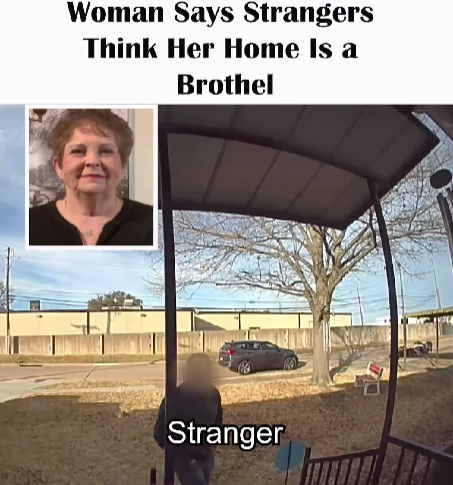A 66-year-old woman says she’s living a nightmare after strangers repeatedly show up at her front door — believing her home is a brothel. The bizarre and unsettling situation has left her frightened, confused, and desperate for answers.
According to reports, the woman, identified as Elaine Jenkins, first noticed the strange activity several months ago when unfamiliar cars began pulling up to her quiet suburban home at all hours of the night. At first, she assumed the visitors were lost or confused. But after one man made inappropriate comments and tried to enter her home, she realized something was seriously wrong.
“I was terrified,” Jenkins said in an interview. “These men would knock on my door asking for women by name — names I’ve never heard in my life. Some even said they had appointments.”
After several unsettling encounters, Jenkins checked her doorbell camera footage — which confirmed multiple men approaching her house, waiting at her door, and then leaving after she confronted them. Some of them appeared embarrassed, while others seemed angry or confused.
Determined to find out what was happening, Jenkins contacted local authorities. Investigators soon discovered that her home’s address had somehow been listed on an illicit website advertising adult services. The false listing, which included her street name and a partially correct phone number, was reportedly being used by scammers posing as escorts.
“It appears someone used her address as a cover location for illegal activity,” a police spokesperson explained. “Unfortunately, this has led to innocent people like Ms. Jenkins being harassed and put at risk.”
Despite repeated requests to have her address removed, Jenkins says the problem has continued. “It’s humiliating,” she said. “I can’t even relax in my own home anymore. Every time a car slows down outside, I wonder if it’s another one of them.”
Local police have since increased patrols in her area and urged the public not to rely on suspicious online listings. They also advised residents to keep security cameras active and report any similar incidents immediately.
The story has sparked outrage and sympathy online, with many users expressing disbelief at how easily misinformation can spread in the digital age. “This poor woman just wants to live in peace,” one commenter wrote. “It’s scary how something like this can happen to anyone.”
Cybersecurity experts say Jenkins’s experience highlights a growing issue — the misuse of real addresses by anonymous online advertisers. “These scams often use random residential addresses to make listings look more legitimate,” said one expert. “It’s incredibly unfair to the innocent homeowners who get caught in the middle.”
For now, Jenkins says she’s grateful for the community support and hopes sharing her story will prevent others from going through the same ordeal. “I’ve done nothing wrong,” she said. “I just want my home to be my home again.”
Her case serves as a stark reminder of how quickly technology can blur the line between online deception and real-world consequences — and how one false listing can turn an ordinary life into a living nightmare.
